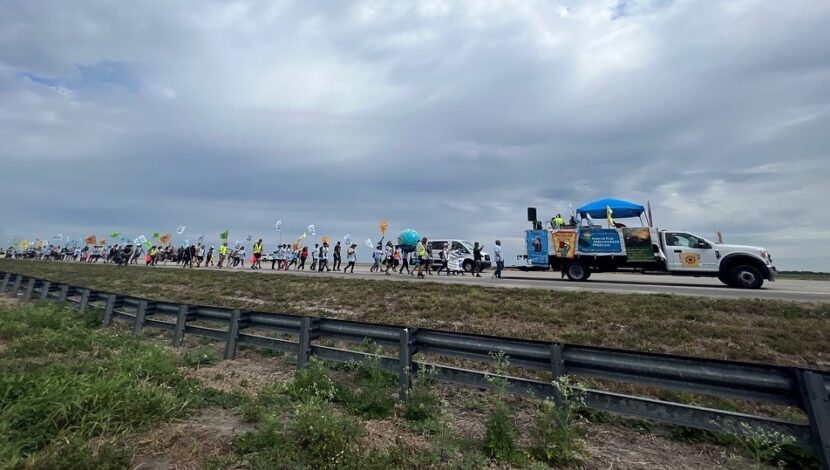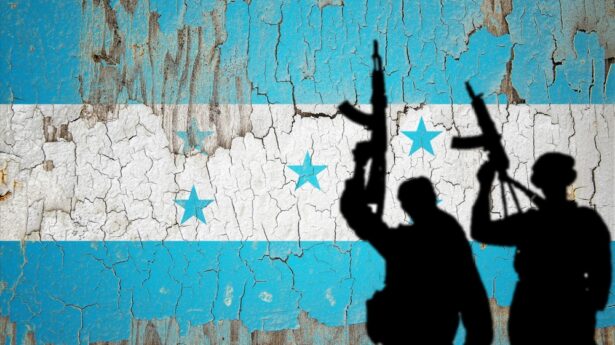The Unitarian Universalist Service Committee advances human rights through grassroots collaborations.
UU Perspective: Allyship With Those Fighting for a Fair Future in the Food Industry

By Rev. Tony Fisher on May 5, 2023
The Coalition of Immokalee Workers (CIW) is a worker-based human rights organization internationally recognized for its achievements in fighting human trafficking and gender-based violence at work. Based in Immokale, Florida, the CIW is also recognized for pioneering the design and development of the worker-driven Social Responsibility paradigm, a worker-led, market-enforced approach to the protection of human rights in corporate supply chains. Built on a foundation of farmworker community organizing starting in 1993, and reinforced with the creation of a national consumer network since 2000, CIW’s work has steadily grown over more than 20 years to encompass three broad and overlapping spheres:
- The Fair Food Program to support farmworkers in several states in the eastern part of the United States;
- The Anti-Slavery Program to end the enslavement of workers held against their will and forced to work on farms; and
- The Campaign for Fair Food, which educates consumers about the issues of farm labor exploitation and holds food retailers such as Walmart, Subway, and McDonalds accountable for humane farm labor practices.
Hurricane Ian landed in September 2022 and was one of the most lethal and damaging in Florida’s history. UUSC’s emergency grant to CIW assisted families and farmworkers in the region with essential supplies in the wake of the catastrophic storm. This also helped CIW to continue its ongoing work organizing farm workers and advancing fair labor practices.
Rev. Tony Fisher, who serves the Unitarian Universalist Congregation of Greater Naples, 25 miles west of Immokalee, and who also sits on the CIW’s Faith Working Group, was one of many UUs present for the Build a New World march, a public demonstration demanding the fair treatment of essential workers. Rev. Fisher walked the entire 50-plus miles and spoke to the marchers on the final day in Palm Beach. Speaking for both his own congregation and as a program leader in the UUA and UUSC’s College of Social Justice, he expressed both the joy and the honor of walking alongside workers from Immokalee and beyond. Rev. Fisher called forth the shared values of love, equity and justice, and urged the marchers to bring their moral compasses and their loudest voices to bear so that those corporate leaders who had lost a sense of moral responsibility could hear clearly the sound of justice and the need to understand that farmworker justice is a win-win proposition for us all.
Below is his account of the march.
#
From their humble beginnings in 1993 as a small group of farmworkers meeting weekly to discuss how to better their community and their lives, the Coalition of Immokalee Workers (CIW), has grown into an internationally recognized human rights organization known for pioneering the design and development of the Worker-Driven Social Responsibility paradigm, a worker-led, market-enforced approach to the protection of human rights in corporate supply chains.
With the inception of the CIW’s Campaign for Fair Food in the early 2000s and the subsequent success in signing on major chains such as Taco Bell, McDonalds, Burger King and Whole Foods, the CIW built the award-winning Fair Food Program (FFP). Within the FFP, farmworkers in Immokalee, Florida and beyond, have begun to enjoy enforceable protections from a litany of human rights abuses that has historically plagued the agricultural industry including sexual harassment and abuse, wage theft, and forced labor.
Unfortunately, workers outside the protection of the Fair Food Program can still experience harsh exploitation. Despite sickening examples of abuse that continue to make headlines year after year, there are still corporations like Wendy’s, Publix, and Kroger that refuse to embrace the gold standard for human rights protections in their supply chain by joining the Fair Food Program.
To celebrate its successes and highlight the work still to be done, the Coalition and its allies recently organized the five-day, 50-mile Build a New World march. Beginning in the agricultural town of Pahokee, Florida, site of the most recently prosecuted case of modern-day slavery, and ending in Palm Beach, Florida, home of the chairman of Wendy’s Corporation, more than 150 workers, students, religious leaders, and conscious consumers from all over the United States, walked shoulder to shoulder for justice. The numbers swelled to almost 600 on the final day as the contingent made their way through the streets of downtown Palm Beach chanting, singing, and waving colorful banners all in the hope of building a new world of freedom for all farmworkers.
Following in the footsteps of 30 years of CIW organizing and more than a decade of documented, unparalleled success in monitoring and enforcing human rights, the Build a New World march was itself a success on many levels. With outlets like The Washington Post and National Public Radio as well as print and digital media from across the country publishing updates on the march, the CIW’s goal of raising awareness of the plight of our essential workers and the need for reform was clearly met. In addition, the growing solidarity of worker-led justice organizations across the country—and now across the world—was exhibited as groups from Minneapolis, California, Vermont, and Chile joined in the march celebrating their connection with the CIW and the model they have created. Finally, the participation of young people, again from across the country was inspiring, infusing the march with energy and great hope for the future.
The CIW continues to spread the good word about worker-led, market-enforced approaches to protect human rights within corporate supply chains, encouraging and inspiring other organizations to flourish not only within the agricultural industry, but within the construction and garment industries as well. And now the new and progressive-minded government of Chile is hoping to implement the model in new industries across a whole country, guaranteeing that all the workers in that nation will be treated well and the goods exported from that country are produced in fair conditions.
UUSC Impact Storyteller Deanna Johnson contributed to the creation of this piece.
Image Credit: Coalition of Immokalee Workers

